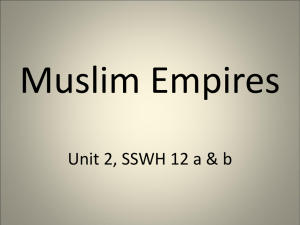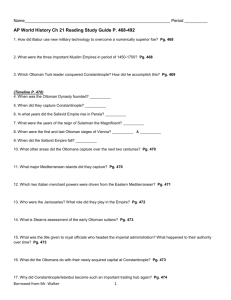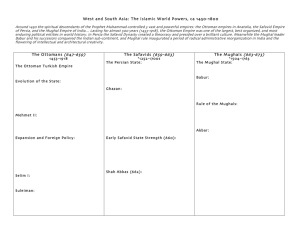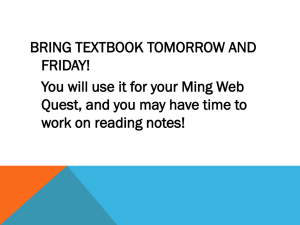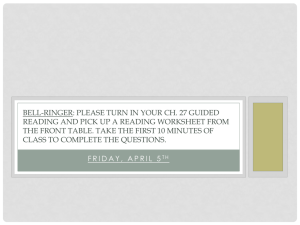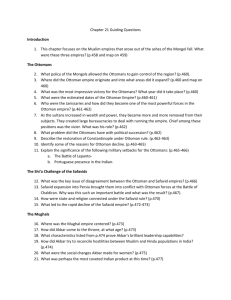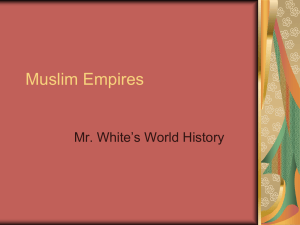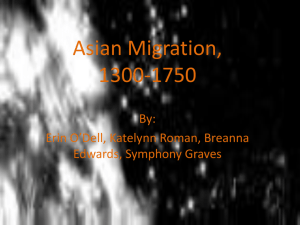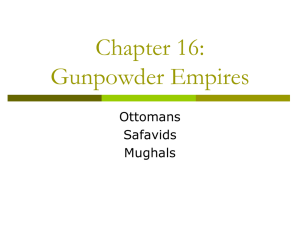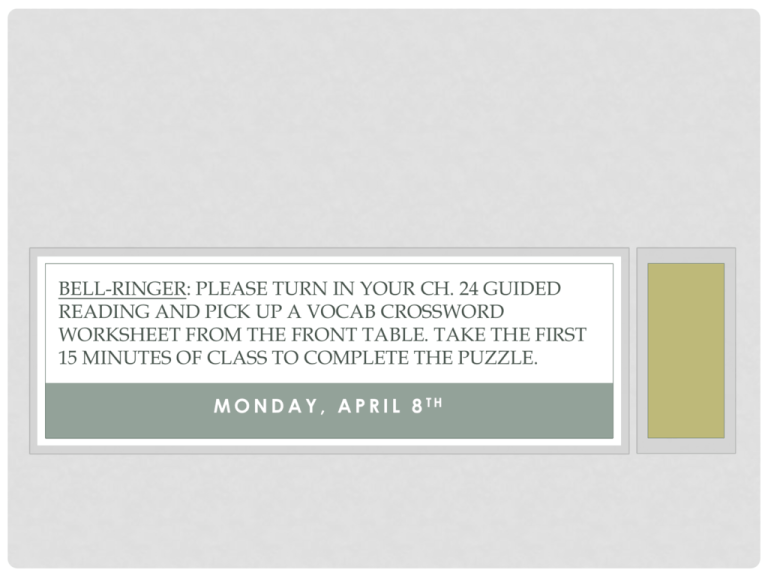
BELL-RINGER: PLEASE TURN IN YOUR CH. 24 GUIDED
READING AND PICK UP A VOCAB CROSSWORD
WORKSHEET FROM THE FRONT TABLE. TAKE THE FIRST
15 MINUTES OF CLASS TO COMPLETE THE PUZZLE.
M O N D A Y , A P R I L 8 TH
DAILY AGENDA:
•
•
•
•
Bell-Ringer: Vocabulary Crossword Review
Word of the Day trite
Lecture: The Gunpowder Empires
Review Quiz
Homework: Read Chapter 24 and complete Guided
Reading worksheet.
TRITE – CLICHÉD; UNORIGINAL
• What are the first words that come to mind when you
think of former American Idol judge Paula Abdul? Most
viewers remember Paula as the “nice” and affable
judge who always said something positive about every
contestant. Although Paul was nice, her comments were
TRITE, banal, and hackneyed. According to platitudinous
Paula, every singer was “great,” “beautiful,” and
“amazing.” While Simon Cowell stung would-be singers
with his caustic barbs, platitudinous Paula encouraged
them with pleasant but insipid compliments like “you’re
authentic,” “America loves you,” and “your journey of
magic is just beginning.” She continues to be just as TRITE
on Simon Cowell’s new TV show X-Factor.
Can you think of
any other TRITE
sayings?
WERE ALL GUNPOWDER EMPIRES
ALIKE?
• Safavid: Shi’ite,
spoke Persian,
“Hidden Imam”
and Twelver
Shi’ism, no navy
• Mughal: Thriving
manufacturing, no
navy, strove for
social harmony,
internal political
decentralization
WHAT WERE THE ADVANTAGES AND
DISADVANTAGES OF A LAND-BASED EMPIRE VS. A
MARITIME EMPIRE?
• Advantages: More centralization of rule, easier to
keep your people unified, requires no navy,
guarantees adequate agricultural production
• Disadvantages: Removed from world trade, lacked
access to new markets and resources, lacked navy
(continued dependence on old military standards)
WOMEN AND POLITICS
• Women officially banned from political activity
• But tradition of revering mothers, first wives from
Chinggis Khan
• Süleyman the Magnificent defers to concubine
Hürrem Sultana
• Originally Roxelana, Ukrainian woman
• Convinces husband to murder eldest son in favor of her own
child
©2011, The McGraw-Hill Companies,
Inc. All Rights Reserved.
8
AGRICULTURE AND TRADE
• American crops effect less dramatic change in
Muslim empires
• Coffee, tobacco important
• Initial opposition from conservative circles, fearing lax
morality of coffee houses
• Population growth also reflects territorial additions
and losses
• Trade with English East India Company, French East
India Company, and Dutch VOC
©2011, The McGraw-Hill Companies,
Inc. All Rights Reserved.
9
RELIGIOUS DIVERSITY
• Ottoman empire: Christians, Jews
• Safavid empire: Zoroastrians, Jews, Christians
• Mughal empire: Hindus, Jains, Zoroastrians,
Christians, Sikhs
• Mughal Akbar most tolerant
• Received Jesuits politely, but resented Christian exclusivity
• Enthusiastic about syncretic Sikhism, self-serving “divine
faith”
©2011, The McGraw-Hill Companies,
Inc. All Rights Reserved.
10
STATUS OF RELIGIOUS MINORITIES
• Non-Muslim protected people: dhimmi
• Payment of special tax: jizya
• Freedom of worship, property, legal affairs
• Ottoman communities: millet system of selfadministration
• Mughal rule: Muslims supreme, but work in tandem
with Hindus
• Under Akbar, jizya abolished
• Reaction under Aurangzeb
©2011, The McGraw-Hill Companies,
Inc. All Rights Reserved.
11
CAPITAL CITIES
• Istanbul cultural capital of Ottoman empire,
massive monumental architecture
• Rededication of Hagia Sofia church as Aya Sofya
mosque
• Isfahan major Persian city
• Akbar builds magnificent Fatehpur Sikri
• Chooses site without sufficient water supply, abandoned
• Taj Mahal example of Mughal architecture
©2011, The McGraw-Hill Companies,
Inc. All Rights Reserved.
12
DETERIORATION OF IMPERIAL
LEADERSHIP
• Ottoman princes become lazy through luxury
• Selim the Sot (r. 1566-1574), Ibrahim the Crazy
(r.1640-1648)
• Attempts to isolate them compounds the
problem
• Religious tensions between conservatives and
liberals intensify
• Role of women
• Wahhabi movement in Arabia denounces
Ottomans as unfit to rule
• Force destruction of observatory, printing press
• Safavid Shiites persecute Sunnis, non-Muslims,
and even Sufis
©2011, The McGraw-Hill Companies,
Inc. All Rights Reserved.
13
ECONOMIC AND MILITARY DECLINE
• Foreign trade controlled by Europeans
• Military, administrative network expensive to
maintain
• Janissaries mutiny when paid with debased coinage, 1589;
other revolts follow
• Unproductive wars
• European military technology advances faster than
Ottomans can purchase it
©2011, The McGraw-Hill Companies,
Inc. All Rights Reserved.
14
CULTURAL CONSERVATISM
• Europeans actively studying Islamic cultures for
purposes of trade, missionary activities
• Islamic empires less interested in outside world
• Swiftly fell behind in technological development
• E.g. Jews from Spain establish first printing press in Anatolia
in late fifteenth century
• But printing of books in Turkish and Arabic forbidden until
1729
• Handwritten books preferred, but weak levels of dissemination
©2011, The McGraw-Hill Companies,
Inc. All Rights Reserved.
15
WAS THE OTTOMAN EMPIRE MORE
ASIAN OR EUROPEAN?
• Asian: Primarily
Muslims, but open
to other religions;
utilized a large
bureaucracy;
reliance on land
based trade.
• European: Tulip
period featured
European styles
and tastes.
REVIEW QUIZ
USING YOUR NOTES, PLEASE COMPLETE THE QUIZ.
TURN IT IN TO MR. NARUTA WHEN YOU ARE FINISHED.
PARTNER PRE-WRITE:
• Working with the partner of your choice, complete
the essay pre-write provided.
• First, list any specific factual information that you
can in the chart provided. These constitute the
supporting details you would discuss in your essay.
• Next, formulate a acceptable thesis answering the
prompt provided.
• Make sure you have AT LEAST TWO details listed in
each box.
PLEASE COMPLETE A TRF
FORM FOR TOMORROW.
H O M E WO R K :

